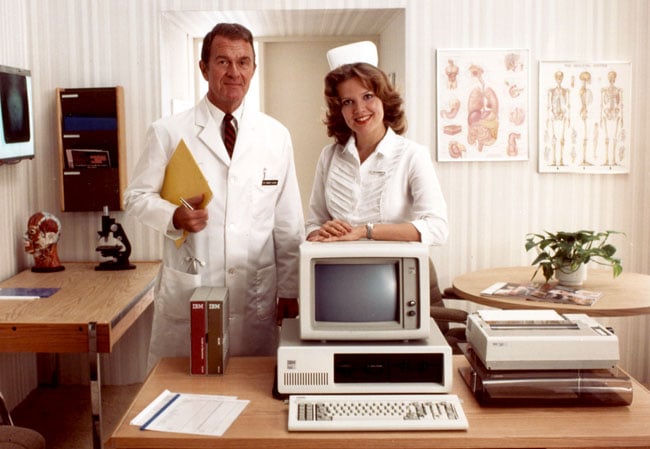Beige Against The Machine: The IBM PC Turns 40

It is 40 years today since the IBM Model 5150 was unleashed upon the world, creating a tsunami of beige that washed over offices everywhere.
IBM was famously late to the game when the Model 5150 (or IBM PC) put in an appearance. The likes of Commodore and Apple pretty much dominated the microcomputer world as the 1970s came to a close and the 1980s began. Big Blue, on the other hand, was better known for its sober, business-orientated products and its eyewatering price tags.
However, as its customers began eying Apple products, IBM lumbered toward the market, creating a working group that could dispense with the traditional epic lead-times of Big Blue and take a more agile approach. A choice made was to use off-the-shelf hardware and software and adopt an open architecture. A significant choice, as things turned out.
Intel's 8088 was selected over the competition (including IBM's own RISC processor) and famously, Microsoft was tapped to provide PC DOS as well as BASIC that was included in the ROM. So this marks the 40th anniversary of PC DOS, aka MS-DOS, too. You can find Microsoft's old MS-DOS source code here.
The basic price for the 5150 was $1,565, with a fully loaded system rising to more than $3,000. Users could enjoy high resolution monochrome text via the MDA card or some low resolution graphics (and vaguely nauseating colours) through a CGA card (which could be installed simultaneously.)
- RIP Bill Lowe: Father of the IBM PC no longer reading drive C
- Lotus 1-2-3 turns 30: Mitch Kapor on the Google before Google
- Rise of the machines, south of Milton Keynes
- Liberator: the untold story of the first British laptop part 1
RAM landed in 16 or 64kB flavours and could be upgraded to 256kB while the Intel 8088 CPU chugged along at 4.77 MHz.
Storage came courtesy of up to two 5.25" floppy disks, and the ability to attach a cassette recorder – an option swiftly stripped from later models. There was no hard disk, and adding one presented a problem for users with deep enough pockets: the motherboard and software didn't support it and the power supply was a bit weedy. IBM would resolve this as the PC evolved.
Importantly, the motherboard also included slots for expansion, which eventually became known as the Industry Standard Architecture (ISA) bus as the IBM PC clone sector exploded.
IBM's approach resulted in an immense market for expansion cards and third party software. And, distressingly for the beancounters at Big Blue, a huge number of imitators. After all, if one could reverse engineer the BIOS then building one's own PC was simply a case of picking the right off-the-shelf parts. Just like IBM.
Not that IBM was too bothered at first – after all, the Model 5150 sold like hotcakes, far surpassing the company's expectations. It was rather good value for money considering the quality of components such as its keyboard and 80 column capabilities and, of course, its software and hardware architecture.
The 5150 was eventually discontinued in 1987, although we wouldn't be surprised to find one or two still lurking in production environments.
IBM's travails with the monster it created are well documented. However, take a moment today to raise a glass to IBM's Boca Raton, Florida team and what would come to be known simply as the "PC".
Many of us owe a career to the arrival of the Model 5150. ®
From Chip War To Cloud War: The Next Frontier In Global Tech Competition
The global chip war, characterized by intense competition among nations and corporations for supremacy in semiconductor ... Read more
The High Stakes Of Tech Regulation: Security Risks And Market Dynamics
The influence of tech giants in the global economy continues to grow, raising crucial questions about how to balance sec... Read more
The Tyranny Of Instagram Interiors: Why It's Time To Break Free From Algorithm-Driven Aesthetics
Instagram has become a dominant force in shaping interior design trends, offering a seemingly endless stream of inspirat... Read more
The Data Crunch In AI: Strategies For Sustainability
Exploring solutions to the imminent exhaustion of internet data for AI training.As the artificial intelligence (AI) indu... Read more
Google Abandons Four-Year Effort To Remove Cookies From Chrome Browser
After four years of dedicated effort, Google has decided to abandon its plan to remove third-party cookies from its Chro... Read more
LinkedIn Embraces AI And Gamification To Drive User Engagement And Revenue
In an effort to tackle slowing revenue growth and enhance user engagement, LinkedIn is turning to artificial intelligenc... Read more

